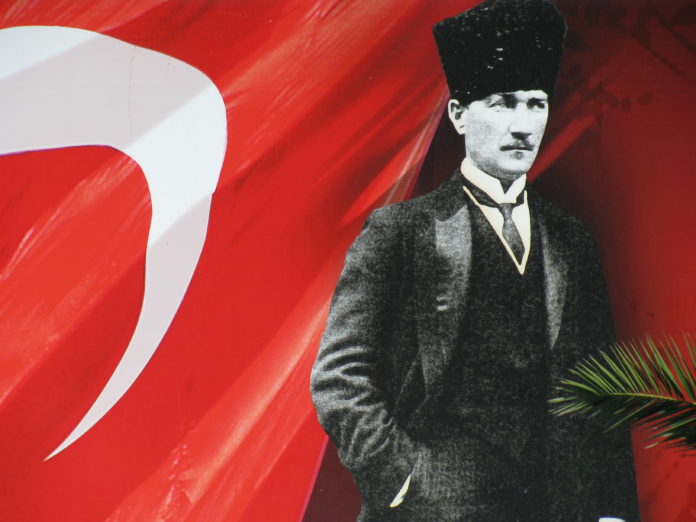Yesterday Turks commemorated the death of Mustafa Kemal Ataturk, the founder of the modern Turkish Republic. Considered a national hero by secular Turks, others revile him as the man who attempted to permanently erase the nation’s Islamic orientation.
A cult of personality has been built around Mustafa Kemal Ataturk since the foundation of the secular Turkish Republic in 1923. Statues and pictures of him are to be found all over the country and it is illegal to even criticise him.
Yesterday the nation marked the 82nd anniversary of his passing. Daily life stopped at 6.05am as sirens wailed to mark the exact moment of his death at 57, while millions of people across the country observed two minutes of silence.
Turks also visited his mausoleum in Ankara to pay tribute to the country’s fiercely secular, pro-West and anti-Islam founder.
But in modern day Turkey many secularists feel Ataturk’s legacy is slowly being eroded by Islamic-oriented Turks, chief among them President Recep Tayyip Erdogan.
Brilliant military career
Ataturk was born in 1881 in the Greek city of Thessaloniki, then part of the Ottoman Empire. His military education started in 1893 when he enrolled in a military school in Thessaloniki. Along with military skills, Ataturk also learned the French language.
Subscribe to our newsletter and stay updated on the latest news and updates from around the Muslim world!
He continued his education at the Military School of Istanbul and graduated as a lieutenant in 1902. Ataturk quickly climbed the military ranks, becoming a staff captain in 1905.
The year 1911 marked a significant point in Ataturk’s life as he fought the Italians in Tripoli and won a decisive victory. Then during the Balkan Wars he played a significant role in recapturing Dimetoka and Edirne provinces in 1912.
Mustafa Kemal lived in a time of decay for the once great Islamic Ottoman Empire. European nations like Britain and France had long surpassed the Ottomans at an industrial, political and military level – so much so that they had become known as “The Poor Man Of Europe.”
The Ottoman Empire’s death knell would come shortly after World War 1, during which it took the fateful decision to side with Germany. Kemal played a significant role in the conflict, first as a junior officer and later as a battlefield commander fighting to expel the British and Greeks from his homeland.
The Battle of Gallipoli against the British and its allies is particularly associated with Kemal who ordered his soldiers “not to attack but to die.”
But despite occasional heroic victories by Ottoman forces, Istanbul was occupied by the allies in 1919 and Ataturk retreated to Anatolia. The Sultan became a vassal of the imperial powers and signed the Treaty of Sevres which dismembered the Empire.
On April 23, 1920, the rebel Grand National Assembly of Turkey was established and Ataturk was elected as the head of the government and speaker of the parliament, which enabled him to adopt laws essential to defeat foreign occupying forces.
The battle of Turkish independence started on May 15, 1919 and lasted until 1923 when the Lausanne Treaty was signed leading to Turkish independence. The Republic of Turkey was founded on October 29, 1923.
Secular reforms
One of Ataturk’s first moves as leader was to strip the Sultan of his powers and he expelled the last Ottoman Caliph in 1924.
Looking West for his inspiration, he shut religious courts and schools and stripped religious leaders of their authority. He also banned the wearing of the fez and the Arabic script, and discouraged the hijab.
At the time Turkey was still a mostly rural, peasant and traditional society in which religion played a very significant role. So these reforms were undoubtedly forced on the people rather than welcomed by them.
Ataturk once said:
“I am not leaving a spiritual legacy of dogmas, unchangeable petrified directives. My spiritual legacy is science and reason….What I wanted to do and what I tried to achieve for the Turkish nation is quite evident. If those people who wish to follow me after I am gone take the reason and science as their guides they will be my true spiritual heirs.”
And:
“It is claimed that religious unity is also a factor in the formation of nations. Whereas we see the contrary in the Turkish nation. Turks were a great nation even before they adopted Islam. This religion did not help the Arabs, Iranians, Egyptians and others to unite with Turks to form a nation. Conversely, it weakened the Turks’ national relations; it numbed Turkish national feelings and enthusiasm. This was natural, because Mohammedanism was based on Arab nationalism above all nationalities.”
Legacy
Ataturk remained president of the Republic until November 10, 1938, when he passed away in Istanbul at the age of 57 due to cirrhosis of the liver. He had been a heavy alcohol drinker for most of his adult life.
From a Western perspective Ataturk made Turkey a successful, modern, peaceful state where Kemalism, embodied by the military, became the dominant ideology. In fact, the military has conducted several coups to uphold it.
But from an Islamic perspective he was undoubtedly the man who helped end the glorious Ottoman Caliphate as well as secularise the Turkish nation.
And many secular Turks (approximately half of the population) now feel that Ataturk’s legacy is under threat.
The Islamic-leaning AK Party has now been in power since 2001 and has rolled back many of the secular reforms which marginalised the role of Islam in public life.
But they insist they are not trying to overturn the secular system and President Erdogan, like millions of other Turks, regularly pays tribute to Mustafa Kemal Ataturk.


















